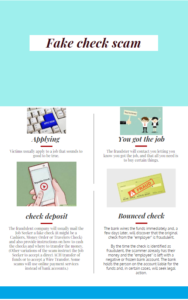404
We're sorry, but the page you were looking for doesn't exist
We're sorry, but the page you were looking for doesn't exist

If you are reporting a job listed on the InclusionP site, please email fraudcenter.com the helpful job information. Helpful information would include any Job ID listed on the posting or the URL to the job, which you can copy and paste from the address bar. To report a phishing email please attach with the full email headers or simply attach the original message to any emails being sent to fraudcenter@info.com
If you are not sure how to send us the extended email headers, information on finding full headers can be found at https://mxtoolbox.com/Public/Content/EmailHeaders/
Create a Unique password for your account. Do not share password with anyone. Never provide sensitive personal information during the initial application process. When applying for jobs online, be cautious of recruiters who ask you to send information to an email address that is not associated with the company. Email domain should contain actual company name, like @inclusionp.com Be extremely careful providing information such as your Social Security number, Driver’s License number, Date of Birth, or other sensitive information that might make it easy for a fraudster to use that information to steal your identity. We recommend that you never place this type of information on your resume. However, please keep in mind that most companies will require your social security number when filling out an actual application. If you are asked to fill out an application online, on that employer’s website, you can check to see if that page is secure (the address bar should read “https:”) If you have any questions please contact: info@inclusionp.com
Phishing is a type of scam used to trick users into divulging sensitive information. Scammers will often pose as a legitimate company in order to steal financial information or account credentials. Phishing emails usually contain attachments, or documents. If you receive an email that you suspect might be a phishing attempt, don’t click on the URL within the message! Please be sure to check the destination URL on the link contained within BEFORE attempting to login or submit any information. By simply hovering your mouse pointer over the URL, many email applications will display information on where the URL actually takes you When in doubt, contact a trusted source at the company, such as calling their Customer Service department, to verify what communications have come from them. It is also recommended to hand type the known URL of the company into the web browser before logging in instead of clicking on any links sent to you within messages purporting to be from the company.
If you suspect you been a victim of a phishing email please contact: info@inclusionp.com

Scam victims are usually offered at home job, which usually consist of shipping out packages that are stolen goods. The scammer usually provides a check for reimbursement and compensation checks that would usually bounce. In addition to seeing their own paychecks bounce, those who fall for reshipping scams may be liable for shipping charges and even the cost of goods purchased online with stolen credit cards.
If you suspect you been a victim of a job scam please contact: info@inclusionp.com

Money Mule is someone that’s recruited, sometimes unwillingly. Fraudsters will contact victims via spam emails, job search websites, and etc. Jobs are usually advertised as, “representative”, “sales manager”, “customer service” Fraudsters then convince the victim to work for their “fake” company, and once you are recruited money mules will receive funds into their account. These funds will have been stolen by the fraudsters. Mules are then asked to take these funds out of their account and to send them to someone else, minus a commission payment.
File a report to the FBI Internet Crime Complaint Center (IC3) or the FTC
If you suspect you been a victim of a job scam please contact: info@inclusionp.com

In a fake check scam, a person you don’t know asks you to deposit a check— sometimes for several thousand dollars, and usually for more than you are owed — and send some of the money to another person. The scammers always have a good story to explain why you can’t keep all the money. They might say they need you to cover taxes or fees, you’ll need to buy supplies, or something else. Most common fake check scam is the victim applies online and gets hired as personal assistants. They get a check and are told to use the money to buy gift cards or to buy equipment or supplies for their new client. Once the scammers get the gift card PIN numbers, they use them instantly, leaving the “personal assistant” without the money when the bank figures out the check is bad.
If you suspect you been a victim of a job scam please contact: info@inclusionp.com

COVID-19 scams to look out for
During these tough times a lot of people are taking advantage of the COVID-19 outbreak to scam people, please be mindful and consider some of these tips
Here are some examples of coronavirus and COVID-19 scams:
Phishing scams: Scammers posing as national and global health authorities, including the World Health Organization (WHO) and the Centers for Disease Control and Prevention (CDC), are sending phishing emails designed to trick recipients into downloading malware or providing personal identifying and financial information.
Government relief check scams: Scammers send you a message make a social media post claiming you qualify for a COVID-19 government grant and just need to click a link to fill out the “necessary” personal information. In the process, your identifying information is stolen
Robocall scams: Scammers are using illegal robocalls to pitch everything from scam Coronavirus treatments to work-at-home schemes. Don’t press any numbers. The recording might say that pressing a number will let you speak to a live operator or remove you from their call list, but it might lead to more robocalls, instead.
**If you believe you are a victim of an internet scam or want to report suspicious activity, visit the FBI’s Internet Crime Complaint Center at www.ic3.gov.**
High Risk Job titles-
These job titles are few examples of what we have classified to be high risk, please be mindful when applying for a jobs.